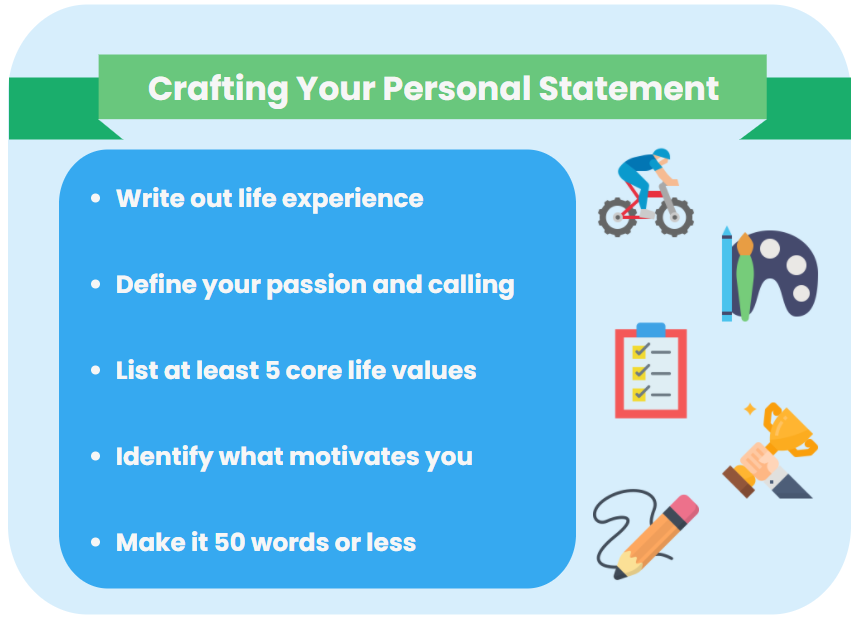A personal statement is a short composition where you tell the readers about yourself, revealing who you are beyond your educational performance. When writing a college personal statement, you should focus on your background, goals, interests, values, and life lessons. Such a paper may vary in depth and complexity. For instance, a college personal statement of 250 words is a more concise and focused text that might be required for a scholarship application or a study abroad program. A 500-word personal statement allows for more detail and narrative; it can be assigned as an admission essay or as part of a fellowship program application.
In any case, a personal statement should articulate:
- Why you are applying to a particular program
- What drives you
- What your career and personal aspirations are
Looking for more guidance? On this page, our experts have prepared a comprehensive guide on personal statement writing along with some great college personal statement examples (250 words and 500 words) to inform and inspire you.
Sometimes, reading a well-written and inspiring personal statement example is not enough to craft your own. You might struggle to highlight your strengths openly or find the right balance when describing your study and career aspirations. If you’re in search of a more personalized approach than the one in this article, consider buying a personal statement from Custom Writing. Our experts are here to help you at any stage of the process, be it starting a fully personalized text from scratch or polishing your final draft. Boost your chances of approval with us!
🧔 What Is a Personal Statement?
Many high school students think they have never written a 250-word personal statement before. But most of them are mistaken. Why is this? You have probably written plenty of personal essays as a high school student. Though, they differ from what you’ll have to deal with for your college application.
A personal statement should reveal information about its author (in other words, you). You cannot stay indifferent, discussing any topic within this task.
For example:
A personal statement on literature should go beyond your opinion of your favorite book. (Definitely do not write a report!) Instead, it should indicate what your favorite book means to you. Similarly, if you’ve chosen to write about your favorite sport, you must write about how and why you feel about it. See the pattern?
Most of all:
Don’t forget that you are the star of your personal statement—no matter what, you are the topic.
🔑 Keys to 250-Word Personal Statement
Before getting into the details about what makes a college application special, let’s review essay writing fundamentals. These rules should guide you every time you sit down to compose your statement:
- Planning your writing is essential. Don’t throw an essay together at the last minute. Think about what you’re going to write, outline your personal statement, and then execute it.
- Be sure to use a solid writing structure, especially if you have a freeform essay prompt. Many college admissions essay prompts are freeform, but don’t let your personal statement format be freeform. However, this shouldn’t be a problem because you already know the best personal statement format! Always use a properly structured essay format with a clear introduction, thesis statement, body, and conclusion (like the 5-paragraph essay).
- The foundation of all good writing is rewriting—so don’t submit the first draft! You’re not a professional writer, but even acclaimed writers always need to edit and rewrite to perfect their prose. If you don’t have multiple drafts of your personal statement for college, you are in trouble. You even may want to use a reworder in order to make your text perfect.
- Make sure your essay addresses the prompt. The first and only impression most college applicants get to make is through their application essays. A strong personal statement should always address the prompt directly. If the admissions committee thinks you’ve adapted old writing for your application, they might think you don’t know how to follow directions.
- Get the reader’s attention by showing what makes you unique and a great applicant. Put yourself in the position of the college admissions staff. They read tons of essays. Accordingly, you should focus on grabbing the attention of the reader, but in the right way. Don’t lie, exaggerate, or try to be memorable for the wrong reason. Instead, find ways to emphasize the unique traits about yourself that would make you an ideal college student.
- Time is the most precious resource…
- …so start writing early and don’t procrastinate! Rushed writing is typically bad writing. When you have the time to write (and rewrite), the finished product will be superior. If you know that you have an application essay due next month, try producing a draft today.
- …so don’t waste your reader’s time. This is the most important rule of writing. When an essay has to be 500 words in length, for example, make sure that you’ve chosen an appropriate topic. If you can only write 250 words on a subject and the rest is filler, your readers will feel like their time was wasted.
If you can follow this small handful of rules, you will be ahead of most college applicants. Remember, getting into college is a competition, so it is vital to learn how to write a strong personal statement.
🌟 How to Write a 250-Word Personal Statement
So you’re finally ready to write your personal statement? You’ve Googled “write personal statement sample” and “how to start a college personal statement,” so now you know how to start a personal statement, right?
Not so fast:
Have you brainstormed? Have you written an outline? Have you developed the perfect thesis statement? If you haven’t performed these crucial steps, then you aren’t ready.

🏁 Starting Off
Here are a few more tips to ensure you get your personal statement started off on the right foot:
- Think about a similar writing process.
Ponder the following. A college application essay is just a persuasive essay in which you are trying to persuade your reader that you would make an excellent college student. Of course, you want to be more subtle, but the purpose of a personal statement for a college application is persuasion.
- Read personal statement examples.
Many prestigious universities publish a handful of sample personal statements from successful applicants. These are the best sorts of personal statement examples, but you should be careful to avoid copying topics or language. Instead, pay attention to similarities to better understand the best format for a personal statement.
- Don’t goof up the simple formatting issues.
Nowadays, the physical formatting of your personal statement matters less than ever because so much text is directly submitted through the web. In case you need to send it as a Word document file, use a standard font like 12 point Arial or Times New Roman. Do not make tiny or huge margins.
Nonetheless, you may want to add a heading that includes your name. This way, you’ll be sure that you are given credit for your extraordinary personal statement—even if your printed essay is misplaced. Most importantly, check any formatting requirements and apply them before writing one word.
- Pay attention to the strengths of a school or program to which you are applying.
If you are applying to a college with strength in agriculture, you should write an essay that shows how well you understand crops or livestock. If you’re going to an engineering school, you should highlight your dexterity with calculations. In the case of a military academy, the last thing you want to do is describe how much you hate following rules.
Armed with these guidelines for a 250-word personal statement for college, you should be able to start writing an excellent essay to get into any school.
What to Write in a Personal Statement for College?
For a college application, a standard format includes the following key points:
- Introduction (name, age, place of residence);
- Educational background (all levels + related courses);
- The desired program you’re applying for;
- Justification of your choice, your motivation;
- Relevant additional details about you.
Writing Tips
There are many tips for writing the best college application essay, and here are a few of the most vital.
- First: Remember the purpose of writing a personal statement for a college application.
The answer is to get into the colleges to which you are applying. You’re not writing to express yourself, though good personal essay examples typically do that. Instead, you need to impress a university staff member, reading dozens of papers every day for a month.
- Second: Select a topic that contributes to your success.
Since the goal is to get admitted to a college, you need to put your best foot forward. Try to choose a topic that highlights one of your most positive attributes.
Suppose you can write about a topic that clarifies what a great college student you will be—it’s excellent! Try to use your personal statement to show your incredible drive and resilient character inside the classroom and out. But again, don’t lie or exaggerate.
- Third: Write about activities that define your personality.
If possible, write about activities that are on your application elsewhere, but are not well described. In case you were a class president, you might want to mention that.
However, if you started a unique club that did charity work, tutoring, or anything else benefiting the community, this would be a superior topic. Class presidents are popular students, while students who create positive change in their communities are rare gems.
- Lastly: Never waste your reader’s time.
Follow the general rules given earlier in this article, but pay special attention to this one. The admissions staff that reads these college essays must read many application packets daily. They want to feel like every paper they read is worthy of their attention.
For this reason, never include filler in an admission essay. If there are any wasted words in your college personal statement (whether 500-word or 250-word one), cut them immediately.
🕵️ Specific Personal Statement Secrets
What if you’ve already been admitted to your dreams’ college? And now, your goal is to get into the graduate program. Or you’ve studied hard, done well in college, and decided to go to law school. Last but certainly not least, you may be applying to medical school.
You’ll need a personal statement that will get you in the school or program for all these cases. Below, we’ve gathered some tips for these particular instances.
🎓 Graduate School Personal Statement
Many students have to settle for safety schools when attending college. Still, graduate and professional institutions can provide a second chance to achieve your academic dreams.
But wait:
Before you dust off the college application essay that got you into your current university, you should consider that graduate students’ standards are higher. You have to work a lot to get your Master’s degree or a Ph.D.
Here are a few tips that you should follow if you want to get into your dreams’ graduate program.
- Pick graduate programs to apply to that suit your strengths from your undergraduate education. This isn’t exactly a writing tip, but it is a tip that makes your writing much more manageable. When you sit down to write your grad school application essays, it can be relatively easy if your résumé screams that you are a perfect fit.
- Try to find and read more than one successful graduate school personal statement sample. If you are an overachieving undergraduate student, like many future grad students are, you may have strong relationships with your teaching assistants, instructors, and even professors. Many of these people may have graduate school 250-word personal statement examples from their graduate school applications. Many of them would be happy to share them with you if you promise to be nice. After reading a successful personal statement or two, you may see what is expected of a grad school applicant.
- Don’t be afraid to reach out to the graduate program or your future graduate advisors ahead of time. Graduate school is not like undergraduate programs—you will probably work very closely with a professor. Accordingly, you should email or even phone them before you apply. The content of your conversations will shape your personal statement. For example, you may know the professor you want to work with also wants to work with you. Then you should include that information in your personal statement.
- Get help from current or past grad students! Again, if you are an overachieving undergraduate, make sure to use your professional contacts to write the best essays possible. Some constructive criticism on your application materials could be just what you need to get admitted.
These tips are just the beginning of writing one of the best grad school essays that will be submitted to your graduate program of choice.
Above all else:
Remember to follow all the norms within your field. Every discipline and subject in graduate school has slightly different standards. Only use those tips applicable to your domain.
⚖️ Law School Personal Statement
Don’t make a boneheaded mistake with your law school personal statement! Following the rules outlined above is just a start. You’ll also need to read a few law school personal statements and pay attention to these specific features in the application process.
- Make sure to use crystal clear language. Practicing law is all about communicating logically and persuasively. These three elements of communication are the fundamentals of being a successful lawyer. If your essay does not demonstrate these qualities, you will probably not be admitted to law school.
- Don’t focus too much on your love of the legal professions or process. It is a little known fact that most lawyers never enter a courtroom in the average year. Trial lawyers make up a small percentage of lawyers. Most are corporate lawyers who use their expertise to advise their firms and write and analyze contracts. And of course, many individuals with law degrees use their legal knowledge, training, and skills for totally unrelated professions. Accordingly, you should focus on writing an essay that describes the positive attributes. Show what makes you well suited to learning and writing about law, rather than your long-term professional goals.
- If you do talk about the implications of a legal profession or its importance to you, be careful! If you insist on writing about your imagined future as a judge or your deep and eternal love of the law, make sure your writing does not contain inaccuracies. Remember, the people reading your law school personal statements are probably lawyers—and they almost certainly have better understandings of the law than you. If your law school personal statement contains any legal content, perhaps have a lawyer read it.
🏥 Medical School Personal Statement
Medical doctors, optometrists, and dentists each have their special schools with their stringent standards. As such, read some sample essays and follow these tips to ensure your success.
- If you are applying to medical school, be sure you apply to a program that might accept you. Be realistic when assessing your résumé, transcript, and MCAT scores. The medical schools you are applying to should be within reach. If you can match your desired schools’ qualifications, your medical school personal statement will be much easier to write. (However, one nice feature of med school personal statements is that you can often write an AMCAS personal statement and use it for multiple programs.)
- Demonstrate your skills as both a scholar and a scientist. Medical school in the 21st century is equal parts book smarts and scientific knowhow. If you have laboratory research experience, make sure to share it. If you’ve had scientific publications, they need to be a focus of your personal statement.
Thank you for reading! We hope all these tips were helpful, and now you can nail your college personal statement. Share the article with other people who may find it useful for their essay writing.
Further reading:
- Scholarship Essay Examples about Yourself
- How to Write a Scholarship Essay about Why You Deserve It
- Financial Assistance Essay: Useful Tips to Make It Rock
- How to Write an Essay Describing Your Financial Need
- Why I Want to be a Pharmacist Essay: Step-by-step Guide
- Why I Want to Be a Teacher Essay Writing Guide
- College Application Essay Writing Mistakes to Avoid
🔗 References
- How to Write a Great College Essay, Step-by-Step: Alex Heimbach, PrepScholar
- 10 Top Personal Statement Writing Tips: Studential
- Editing the Essay, Part One: Kim Cooper, for the Writing Center at Harvard University
- Popular College Application Essay Topics (and How to Answer Them): The Princeton Review
- Paragraph Structure: University of Maryland, Global Campus
- College Essay Examples, How to Write Your Story: US News
![Internship Essay: Example & Complete Writing Guide [2026]](https://custom-writing.org/blog/wp-content/uploads/2020/12/internship-student-e1565190155561-284x153.jpg)




![Quieting Your Inner Critic – Self-Compassion and Other Methods [Guide for Students]](https://custom-writing.org/blog/wp-content/uploads/2024/03/side-view-woman-looking-up-1-284x153.jpg)





